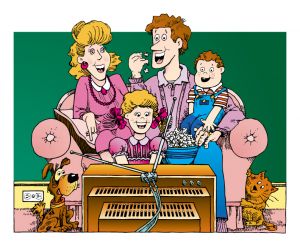By Stacy Jagger, MMFT, owner of Sunnybrook Counseling and Music with Mommie, www.stacyjagger.com
As a mother of two children and a newborn, I understand completely how media can become a crutch and a babysitter at times for our children, even for those of us who are mainstream TV-free, and who rely on educational programs, family-based movies and school-based computer enrichment activities. Our world has become more “virtual” than real, and it is sometimes necessary and healthy to take a break altogether to regroup, refocus and reconnect with our children, our spouses and ourselves.
What better opportunity to experience this than Screen-Free Week? It’s a time to get back to the basics and reflect on why connection-based parenting is not only our parenting theory but the way we actually choose to live our lives.
Here are three thought-provoking, guilt-free ways to instill creative discipline in our families while reconnecting with our children during Screen-Free Week.
1. Put the TV and computer in the closet for the whole week.
“What!? I can’t do that,” you may be thinking. Many of us won’t. Some of us will. But isn’t our reaction telling us about how much the media has power over us? It’s one measly week, a seven-day respite where the cell phone, computer and TV are not calling the shots. What in the world will we do?
There was a period in my life where I desperately needed to unplug. My husband and I did not have children yet, but we proactively and adventurously decided to pack up our belongings, put them in storage, and live in an 1850s cabin for 18 months, without even electricity. EIGHTEEN MONTHS?! Yes, 18 months. And the first day was the hardest. The first day I literally looked at my watch every five minutes and felt like it had been at least three hours. I didn’t think I would survive. I thought, “Oh dear God, what have I done? I surely made a terrible mistake.” As I sat on the rickety front porch I thought, “This is it. I have officially lost my mind.”
But as the minutes and the hours ticked by, my mind and heart began to slow down. I began taking in life in real time. And I began to realize that life in real time was slower than I had ever imagined. Little things like the whistling wind, the green rustling leaves, the sounds of the cattle farm next door, and most of all the quieting of my mind began to take on a new meaning. And it wasn’t so bad after all. It was a rest I had never known but one that I had needed for some time, probably for most of my life.
I learned many lessons from my cabin adventure, and the one that stands out the most is that the busyness of life had robbed me of experiencing life itself, life that happens in the now. This was not something I was willing to surrender anymore.
So whether you choose to lock your media in the closet for one hour, one day or the whole week, I hope you will find an adventure and connecting presence in your “virtual-free” time and see that “busyness” and “life” are not one in the same.
A great tradition worthy of starting is a “Technology Turn-Off Time” each evening where we turn off our cell phones, televisions and computers, and just sit and read with our children, play a game or go for a walk. Twice a year, we could even have a “Technology Turn-Off Trip,” where we vacation away or staycation at home and remember to experience life without virtual means.
2. Look your children in the eyes and feel your feelings.
In our media-saturated world, our computers, televisions and cell phones have taken the place of simple eye contact, even with those we love most. To gaze in your child’s eyes, using words or no words, is a healing and bonding experience at any age. It helps us to get in touch with our most primary emotions, many of which we have unfortunately left behind in order to survive our adult world.
A therapist friend explained the concept to me that the word “intimacy” is “into me see.” We teach this type of “into me see” early on with our children. What we don’t realize is that when we forget to bond with our children while feeling our feelings and empathizing with theirs, we are sending them an important message for the rest of their lives. We are saying, “This is too hard,” “I am too busy for you,” “I am not comfortable with this.” This message eventually matures into their adult relationships where it is no longer parent-child, but spouse-to-spouse.
We can use the “replacement principle” in this matter and, instead of sending those negative messages, forgive ourselves and take the time to bend down, look our children in the eyes, giving the message, “You are important,” “I like you,” “My time is well-spent with you,” “I want to know you.”
We are in essence saying to ourselves: I may not have received this when I was a child to the degree that I wanted or needed it, but I recognize the importance and choose to slow down, guard this bond, reconnect and repair from what is familiar to me. I can do this. I can slow down and be with myself and with my child, minute by minute. And when I fail, I can repair. I can humble myself and say I’m sorry, I was wrong. Please forgive me. Now let’s go have some fun!
3. Experience nature.
One of my heroes is Richard Louv, and his wonderful book, The Last Child in the Woods, literally changed my life and way of thinking. What was in my heart, he put into words. What I knew to be true, he communicated brilliantly. Childhood completely separated from the natural world may be no childhood at all. There may be a forever void in children who are more comfortable plugged-in than unplugged. Children were made to be outside. Media is a wonderful tool that can enhance our lives. It is our job as parents to limit our children’s access to media, and to give them the tools to combat our culture’s message that unstructured time playing outside is a waste of time. It is just the opposite.
Time children spend in nature is a natural healer. It teaches them the circle of life, how long things actually take to grow, how to work together as a team. It really is a child’s first classroom for creativity, problem-solving and emotional and intellectual development. Connecting with nature goes hand-in-hand with connecting with people. Children learn the value of life, the value of a moment, and how moments pass quickly. Children need time to be children. Excessive media robs that from them.
So for this week, turn off the screens. Sit in the silence. Feel uncomfortable. And let it pass. Then watch the birds, the bees, the trees, and find the magic in the moment. With yourself. With your child. Experience life in real time, and then write about it. I would love to hear from you.

 Most parenting experts advise that parents use extreme caution in allowing their child to watch television, especially younger children, and even with educational programming. And many attached parents either don’t allow television at all or only sparingly. But there are some of us who do allow our children to watch TV and are OK with it.
Most parenting experts advise that parents use extreme caution in allowing their child to watch television, especially younger children, and even with educational programming. And many attached parents either don’t allow television at all or only sparingly. But there are some of us who do allow our children to watch TV and are OK with it.